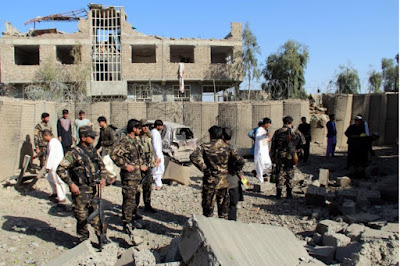[In the most lethal strike, insurgents overran a checkpoint in Farah Province around 3 a.m. Saturday. An Afghan Army spokesman said that 18 government soldiers were killed and two others wounded, and that a firefight with the attackers had continued even after reinforcements arrived.]
By Andrew E. Kramer
 |
|
The Taliban staged
several deadly attacks in Afghanistan on Saturday, including
in Lashkar Gah, in Helmand Province.
Credit Watan Yar/
European Pressphoto Agency
|
The insurgents have been striking checkpoints
and small outposts at night in the turbulent southern provinces of Farah and
Helmand.
In one attack, the insurgents detonated
explosives packed into an American-made Humvee that had been captured from the
Afghan Army. And in another, they made off with a Humvee, replenishing their
supply.
In the most lethal strike, insurgents overran
a checkpoint in Farah Province around 3 a.m. Saturday. An Afghan Army spokesman
said that 18 government soldiers were killed and two others wounded, and that a
firefight with the attackers had continued even after reinforcements arrived.
A member of the provincial council in Farah,
Dadullah Qani, said that more than 20 soldiers had been killed and that the
Taliban had captured the Humvee and burned an army truck.
“The fighting between the Taliban and the army
continued for more than two hours,” he said.
A spokesman for the Taliban, Zabihullah
Mujahid, offered a slightly different account in a statement delivered on the
messaging service WhatsApp. He said the insurgents had overrun the checkpoint,
killing 25 soldiers, capturing two alive and making off with both a Humvee and
a truck.
“A lot of heavy and light weapons were also
captured,” Mr. Mujahid said.
The Taliban also staged two suicide strikes
in Helmand Province, including the one involving the explosive-laden Humvee,
which are armored and are sometimes able to drive through defensive fire.
Those attacks killed two soldiers and wounded
about a dozen civilians, including women and children, according to regional
and hospital officials.
Also on Saturday, a suicide attacker
detonated explosives at a checkpoint in Kabul on the edge of the Green Zone, a
heavily guarded district of embassies, Afghan government offices and the
presidential palace.
The attacker detonated the bomb after
soldiers and intelligence officers stopped him at a checkpoint, said Najib
Danish, a spokesman for the Interior Ministry. The blast killed at least three
people and wounded a half-dozen others, he said.
An official with the National Directorate of
Security, Afghanistan’s domestic intelligence agency, said that an officer with
the agency who was killed had hugged the attacker after discovering the bomb,
shielding his colleagues from the blast.
The headquarters of the United States-led
international forces in Afghanistan was briefly locked down after that attack,
but opened soon after for a briefing by members of the NATO delegation, led by
Gen. Curtis M. Scaparrotti, the supreme allied commander in Europe.
“I believe we made substantial progress,”
General Scaparrotti said of his impressions from the visit.
The delegation met with Afghan officials
ahead of a multilateral peace conference in Kabul scheduled to start on
Tuesday.
Last month, President Trump seemed to dismiss
negotiations with the Taliban, though talks between the American-backed Afghan
government and insurgents are the stated United States plan for ending the war.
“We don’t want to talk with the Taliban,” Mr.
Trump said at a meeting with United Nations officials. “There may be a time,
but it’s going to be a long time.”
In Kabul, Kay Bailey Hutchison, the United
States representative to NATO, clarified that Mr. Trump had spoken in the
aftermath of several deadly attacks in the capital.
“I think after that, however, going forward,
he absolutely supports a peace in Afghanistan,” she said.
Little progress has been made. “There have to
be certain agreed areas of conversation that both sides would be willing to put
on the table,” Ms. Hutchison said. “So, talks about beginning talks are
certainly in the works, in different forms.”
“Don’t think that nothing is happening,” she
added. “There is a lot that is happening in the very beginning stage of a beginning
stage of a way forward.”
Fahim Abed contributed reporting.

